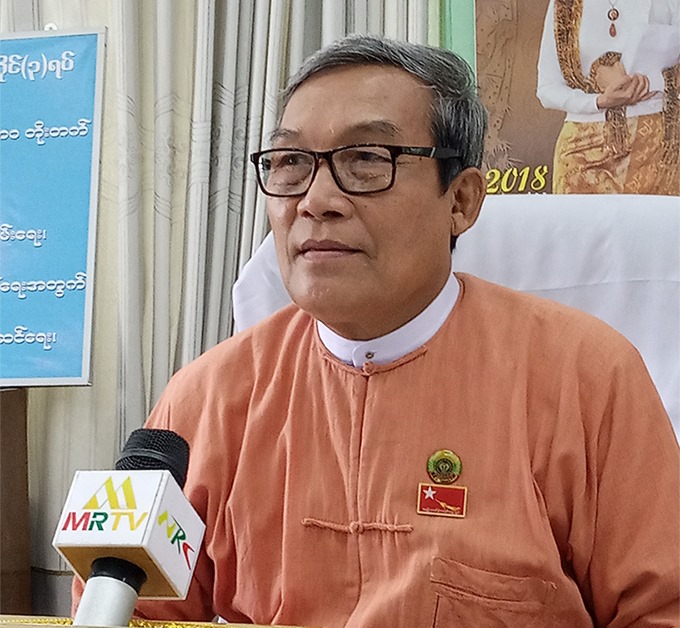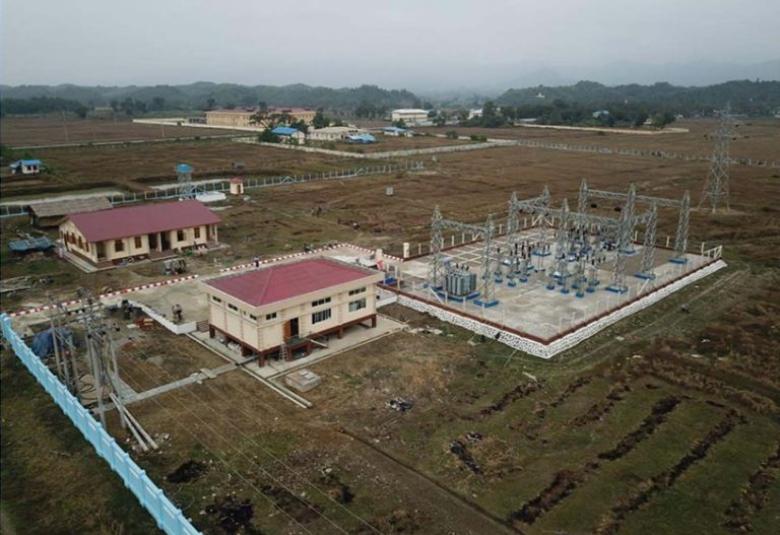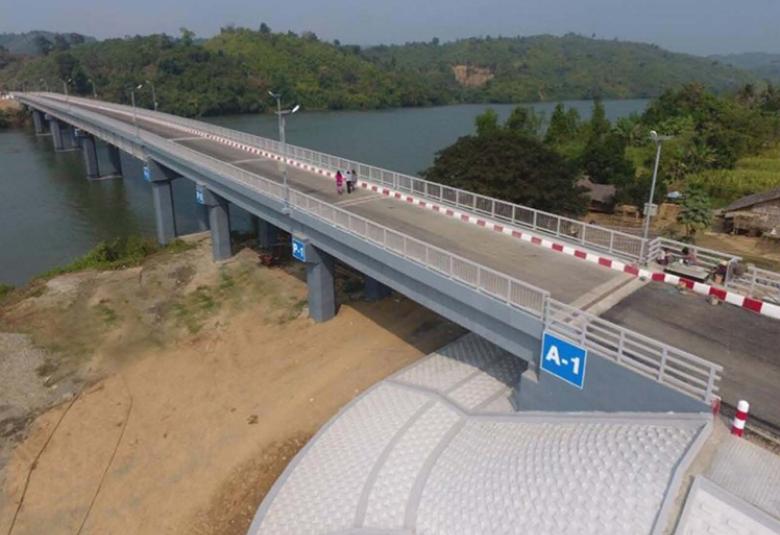8 May
By Thi Thi Min Photo: Saw Maung Thein
Rakhine State Government: Working on multifaceted and motley assortment of tasks for the development of Rakhine State and socio-economic growth of the people.
In smart and speedy steps, the Rakhine State Government is working hard in the tasks such as that of the Rakhine State security; that of the regional development; that of the agriculture, animal breeding; that of the electricity supply; that of the of tourism industry; that of the creation of job opportunities; and that of the socio-economic development through local and foreign investment.
An interview was called on Rakhine State Chief Minister U Nyi Pu and the implementation of Rakhine State Government is submitted to the esteemed readers and the people.
Q: Kindly share us the Rakhine State development including regional peace and security.
A: The Rakhine State Government has successfully implemented the development tasks with visible conditions during the fourth year period. Development outcome are the result of the endeavors exerted by the Rakhine State Government with the assistances of the Union Government, the international organizations, and the people.
In carrying out the security tasks, the three main bodies namely (1) Border Guard and Command Office; (2) the Number four Security Control and Command Office; and (3) Rakhine State Police Force Office have ardently shouldered their assigned tasks.
As of today, although not the entire Rakhine State is safe, most areas including Sittway Town are in stable and secured conditions. Battles are still there. The three main bodies are maintaining the matters on security and stability. In this connection, illegal and unlawful activities have been taken action.
In 2019, total of (305) persons have been arrested in (180) cases with narcotic drugs valued at MMK (7 point 9) million. Crushed narcotic powder, marijuana, black opium, and alprazolam tablets have been seized. The criminals have been arrested who committed the unlawful enticement and persuasion of the people with the Islamic faiths.
At the prisons, the visiting hours for the guests have been extended for more hours to meet the inmates. With the “Thit Sar Project”, the Citizenship Scrutiny Cards have been issued. Those who are ten years and (18) years are issued with relevant cards.
Moreover, tasks are being done in accordance with the 1982 Myanmar Citizenship Laws. Moreover, the “National Verification Process” is ongoing in Rakhine State. The tasks are being undertaken by the Ministry of Security and Border Affairs of Rakhine State.
Q: Tell us on the education matters in Rakhine State.
A: During 2019 – 2020 educational year, there are (174) basic education state high schools; (224) state high school (branches); (218) basic education state middle schools; (304) state middle school (branches); (708) post basic education primary schools; (1,377) basic primary schools ; (280) primary school (branches); totalling (3,285) schools.
Interestingly, upgrading of schools have been carried out at (21) basic education state high schools; (114) high school (branches); (123) basic education state middle schools; (133) middle schools (branches); (67) post basic education state primary schools; (35) basic education state primary schools; (34) primary schools (Branches); totalling (525) schools have been upgraded.
During 2019 – 2020, there were (122) Matriculation Examination centers, where (42,416) boy students and (10,165) girl students appeared for the exam. Total of (23 point 97) per cent passed the examination with (629) students with one distinction; (144) students with two distinctions; (47) students with (3) distinctions; (26) students with four distinctions; (22) students with five distinctions; (16) students with six distinctions.
In Rakhine State, (21 point 45) per cent of the students passed the Matriculation Examination in 2018 and (23 point 9) per cent in 2019, resulted with the increase of (2 point 52) percent. With a view to pull up the percentage, relevant educational workshops, the paper reading sessions; and public talks were conducted.
Q: Kindly share us on health matters.
A: In healthcare sector, the Department of Medical Service has spent MMK (2,959 point 626) millions in (28) projects; (68) healthcare buildings; and (65) staff housings. The Public Health Department has spent MMK (3,960) millions in (44) projects; and (58) hospital buildings. Total of (155) nurses have attended three-year course at Sittwe Nursing and Midwifery Training School.
Social Welfare, Relief and Resettlements Department have provided cash assistant MMK (16,465,620,000) to (249,073) mothers. Moreover, MMK (829,530,000) have been distributed to (27,651) elderly persons as social pensions.
There are young children and their mother residing in far flung areas that could not have access to pre-primary schools. The Rakhine State Social Welfare, Relief and Resettlements Department has arranged (65) units of “mother and children round table care”. Total of (20) children under (5) years are grouped into one round table. The lead mother is provided with MMK (50,000) for one month, and each child is provided with MMK (350) for one day.
Cash aid amounting MMK (853,990,080) have been distributed to the population in the conflict zones and natural disaster areas. Awareness and knowledge talks were provided for (4) events; BDMC event for once; and one multiplier course for mitigating natural disaster for once.
Q: Tell us on job opportunities in Rakhine State.
A: With a view to have job opportunities, the Department of Labour and the GIZ have organized training courses in Sittway such as dress making course; household wiring courses; and motorbike repair course.
In Kyauktaw Township, the training course such as household wiring course and plumbing courses were imparted.
In collaboration with the IOM, the Department of Labour has arranged workshops to impart knowledge on safe migration matters. In collaboration with the ILO, the survey and collection of data and statistics on the workforce is carried out on yearly basis.
Total of (12) persons with different ethnicity have been imparted with training courses. Nationalities namely ethnic Rakhine; ethnic Maramar Gyee; ethnic Khamee; ethnic Dinek; ethnic Thet, ethnic Chin (Lat Tu) have been inducted at vocational schools of weaving at Sittway and also at gemology vocational school.
Q: Kindly share us on electricity supply.
A: There are many visible developments in electricity supply. Our Rakhine State could make improvement far better the other state / regions. There are improvements. There are celebrations held in many villages across the country for the successful completions of electricity supply on (50) per cent voverage. In Rakhine State, we could provide (58) percent of electricity, and therefore we achieve more compared to others.
Especially, Manaung Township has access to electricity for (24) hours. It was done with the solar power electricity supply system. To get the electricity from the central grid of the nation, we have used (11) kV power transmission line stretching (162 point 9) miles; 400 Volt power line stretching (210 point 51) miles; 233 units of (11 point 4) kVA transformers. From the power substation of Maungdaw Town, electricity could be supplied to border areas. It was carried out with the assistance of JICA.
With the capacity of 66 kVA, the Kyein Chaung Power Supply system is being installed. The sub-power station is designed for many voltages is being constructed, and the surrounding (16) villages with (1,453) households have been provided with electricity.
In Kyauk Kyee Village of Thandwe Township, (66) kV power supply sub-station has been constructed and distributed electricity to (69) villages with (4,748) households. JICA has assisted the project.
At Kan Zun Kaing Village in An Township, (33) KV power supply sub-station has been constructed, and that (53) surrounding villages with (4,269) households have been provided with the electricity.
In using the National Electrification Programme or (NEP) system, additional (17) villages in townships namely Sittwe, Ponnagyun, Yanbye (Rambree), Thandwe, and An will be supplied with electricity.
During the fourth year period, budget provide from the Rakhine State Government have been used for power supply tasks in (24) townships. Total of (2,084) villages have been distributed with electricity with the variety of sources such as the electricity, the diesel fuel; the solar system; covering (56) percent of total area in Rakhine State.
Q: Tell us on agriculture and forest in the Rakhine State.
A: In collaboration with Thailand, (10) acres in Aung Daing Village of Sittway Township has developed a “Combine Agricultural System” which is termed as “Community Development Center” with the concept of “Sufficiency Economy Philosophy”
In Rakhine State, there are (14) Reserved Forests; (25) Protected Forests; (1) Environmental Areas; totalling (40) natural areas. Another (5) more protected forest would be expanded, totalling (45) areas, covering (2,659,740) acres.
Q: Kindly tell us on agricultural farm lands.
A: In the fourth year period, Rakhine State Land Management Work Committee have convened (4) meetings and decided (174) land cases. Form number (7) has been issued to (1,157) farmers covering (5,797) acres authorizing access to work on the land.
It also authorized land access permits to (67) farmers covering (575 point 30) acres. It authorized (3 point 95) acres of land to four farmers as authorized by the Central Committee for Land Management.
In connection with the land confiscation matters, (755) land cases out of (842) disputes have been redressed. Among the remaining (87) cases, Rakhine State Land Management and Scrutiny Committee have resolved (74) cases. Therefore, (13) land cases are under process for disposal.
Central Committee for Land Management and Scrutiny have transferred (416) lands complaints cases and that (307) complaint cases have been resolved. The remaining complaint cases of (109) are expected to redress at the end of 2020.
Total of (336) direct complaint cases have been handled and that (284) complaint letters have been resolved. The remaining (52) complaint letters are expected to be settled at the end of 2020.
During four years period, (323) land confiscated cases covering (30,696) acres have been released, and that the lands are being handed over to (4,373) original owners.
In the cases where the confiscated lands could not be released and give back, the appropriate land compensation is being considered on (18) cases owned by (62) farmers. The land covers (163 point 798) acres and that MMK (1,506 point 662) millions have been compensated.
With regards to the direct complaint cases, there are (2) case files involving (28) farmers. It covers (117 point 60) acres and that MMK (439 point 50) millions have been compensated.
Q: Please share us on the basic structures in Rakhine State.
A: Since we assumed responsibilities of Rakhine State administration, we endeavored for the stability and development. For the sustainable socio-economic development, we have drawn projects with the cooperation of local experts and international organizations including UN agencies.
The State Counsellor has given guidelines and directives that the basic structures are to be given priority for the entire development of the area. In line with that directive, we focus attention on basic structure, and that we could say the necessary basic structure have been completely established. Especially, we have done in the areas such as that of the communication, the electric supply, the water supply, and that of social sector. The developments are visibly reflected in the roads and bridges.
In the southern part of Rakhine State, (1300) feet bridge is under construction over the river in Gwa Township. When completed, Rakhine State could be conveniently travel in the whole of the state, and also links with Ayeyawady Region and Bago Region.
Q: Please explain the budget allocation and spending for the development
A: 2019 – 2020 budget allocation saw MMK (208 point 497) billions on state Rakhine State budget and that MMK (190 point 903) billions on the Union Budget side, totaling MMK (399 point 400) billions. 2020 – 2021 financial years have been earmarked with MMK (216) billions.
Q: Please tell us on the tourism industry.
A: In Sittway, Thandwe, Kyaukpyu, Taungup, Gwa, and Ngapali, additional approval have been given to (7) hotels with (243) bed rooms, and (17) guest houses with (320) bed rooms. Three more tourist work licenses have been approved. Therefore, Rakhine State has now (46) hotels with (1,866) bed rooms, and that (48) guest houses have (1,005) bed rooms. We have approved (9) tourism work licenses.
In cooperation among the Rakhine State Government, the Hotel and Tourism Department, and local organizations, “Ngapali Beach Autumn Festival 2019” was held on 20 October 2019. The festival was held with the objective to attract visitors to Ngapali.
It was successfully held with much funfair with the traditional sports competitions, the presentation of traditional food, and the showcasing and selling of local handicrafts.
With a view to development sustainable tourism industry and to induct investment in tourism industry, “Rakhine State Tourism Master Plan (2020 – 2030)” is on the agenda.
With the aim in drafting “Tourism Master Plan”, a workshop was convened with the topic “Comprehensive Strategy for Responsible and Sustainable Tourism Development for Rakhine State 2020 – 2030” at Amazing Ngapali Resort in Ngapali from 25 and 26 January 2020.
Q: Kindly share us on the economic zone and the investment in Rakhine State.
A: For the development of Maungdaw area, the Kanyin Chaun Economic Zone has started in 2017 with the funding of (65) per cent from the Rakhine State Government and (35) per cent from the private side.
Now, the project is (75) per cent completed. It is expected to open during 2020. When the economic zone opens it doors, “One Stop Service” would be applied in expediting the suitable industries to be established in the zone.
Kyaukpyu Special Economic Zone Management Committee Chairman and the CITIC Group Chairman have signed and exchanged “Exchange of Letter (EOL)” on 10 April 2017. The guideline agreement was signed on 8 November 2018.
During the visit of Chinese President to Myanmar, the agreements regarding MOU and the agreements on share matters on the Kyaukpyu Special Economic Zone have been signed on 18 January 2020.
From 2019 to March 2020, Myanmar nationals have invested MMK (2,033 point 780) millions for one industrial project; MMK (2,104 point 5) millions for one Hotel Industry; foreign investors have injected US$ (2) millions for one industrial project; totalling three projects have been authorized. As a result, (403) job opportunities have been created.
Q; Tell us on the city development tasks in Rakhine State.
A: The Rakhine State City Development Body has spent MMK (13,406 point 798) from the Rakhine State funds and constructed (24 point 5) miles with asphalt roads; gravel roads and concrete roads.
The Rakhine State Government spent MMK (1508 point 371) millions on (167) projects on concrete bridges; the water pipes; and other tasks.
The (25) water supply projects has spent MMK (1687 point 950) millions. With the JICA – ODA Loan, “Ye Mann Company” has undertaken the water filter system with blower system at Kandaw Gyi Lake spending MMK (103) millions in 2019 – 2020. The project is completed.
Work programme is on the agenda for Gwa Town water supply with pipe connection at Kyein Ta Li Town storage reservoir by spending MMK (150) millions with Rakhine State funds.
Q: Tell us on the plan to place Mrauk-U area in World Heritage list.
A: On 24 September 2019, the “Nomination Dossier Draft” was submitted for UNESCO heritage list after discussion among local and foreign experts, and the professionals from the UNESCO. On 27 January 2020, the draft was submitted to UNESCO in Paris of Franc.
Q: Share us on the activities in raising reading momentum in uplifting knowledge in Rakhine State.
A: In conclusion, I would like to say that the Rakhine State Government is endeavouring to uplift the literature, knowledge and education of the children. For broader participation, the “Community Center” has been established in cooperation with the Information and Public Relations Department (IPRD) and Daw Khin Kyi Foundation. Since 2018, with the use of mobile library on vehicles of Daw Khin Kyi Foundation with assortment of books numbering (3,000), total of (602) rounds of awareness raising tasks have been successfully conducted. Translated by UMT (Ahlon)




